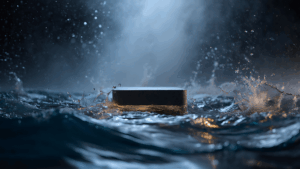As we find ways of helping us to stay healthy, we are inadvertently having knock-on effects on the environment, some of which could then cause more harm to us. Water pollution as a result of our use of pharmaceuticals is a huge problem worldwide. Last year, a study conducted by scientists at the University of York concluded that pharmaceutical waste in rivers poses a “threat to environmental and global health”.
The effects of pharmaceuticals in the natural environment have been studied. It has long been established that pollution from birth control medication has harmful effects on the reproductive lives of fish. Aquatic life is also being adversely affected by our use of antidepressants which alters the brain development and behaviour of fish, as well as affecting their reproductive systems.
And it’s not just the wildlife that will ultimately suffer. For example, the prevalence of antibiotics in water is aiding the development of antibiotic-resistant bacteria which could have disastrous consequences for humanity.
Trade effluent from the pharmaceutical industry
Veterinary and human pharmaceuticals are designed to prompt physical changes in the body, which is why they have the potential to cause harm to wildlife if they get into the ecosystem. The pharmaceutical industry is subject to regulations around trade effluent and is therefore obligated to remove excess and harmful substances before its wastewater is released into the drainage system.
Pharmaceutical waste isn’t always trade effluent
Pharmaceutical waste in wastewater isn’t just a problem for pharmaceutical manufacturers, it’s also a problem caused by us. We all take medication for our health and will therefore excrete it as part of our normal digestive process. Pharmaceutical waste therefore becomes part of our domestic wastewater and has to be treated by our water companies as part of our general waste.
How to prevent pharmaceutical contamination from human waste getting into the environment
According to Water UK, “there is well documented evidence to show that the pharmaceutically active products in hospital waste water can be detected in the effluent from sewage treatment works and aquatic ecosystems. Once in the aquatic environment, there is the potential for harm to living organisms including humans.”
Water UK has issued guidance for healthcare wastewater discharge for hospitals and the healthcare industry to prevent pollution of the UK’s sewerage system. Facilities that discharge more than domestic wastewater will probably need Trade Effluent Consent and many types of waste produced in hospitals such as pharmaceutical waste must be dealt with by specialist companies. While they prohibit disposing of active pharmaceuticals into the sewerage system, patient bodily discharges are permitted via the toilet drainage system.
A group of engineers from Aachen University in Germany pinpointed the higher concentrations of pharmaceutical emissions in wastewater from healthcare centres and developed systems that would remove the pharmaceuticals from it. They discovered that wastewater needed to go through an ultrafiltration membrane bioreactor, then one of three alternative treatments (UV irradiation, granular activated carbon or ozonation) to remove 80% of the investigated substances.
Trade effluent expertise
Castle Water’s specialised team make the trade effluent process simple and have the knowledge and influence to ensure that your interests are properly considered. We will identify the correct consents and licenses, negotiate bespoke consent limits, help you meet regulatory obligations, and support your sustainability and environmental targets. If that wasn’t enough, we’re recognised as a market-leader in trade effluent billing, with our unique platform producing consistently reliable trade effluent bills with the highest degree of accuracy.



